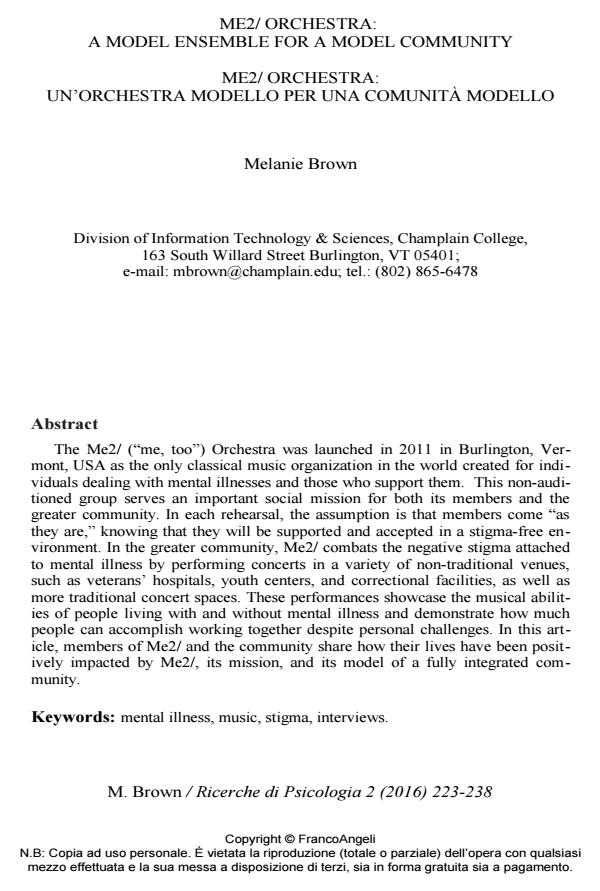ME2/ Orchestra: a model ensemble for a model community
Journal title RICERCHE DI PSICOLOGIA
Author/s Melanie Brown
Publishing Year 2016 Issue 2016/2 Language English
Pages 16 P. 223-238 File size 220 KB
DOI 10.3280/RIP2016-002007
DOI is like a bar code for intellectual property: to have more infomation
click here
Below, you can see the article first page
If you want to buy this article in PDF format, you can do it, following the instructions to buy download credits

FrancoAngeli is member of Publishers International Linking Association, Inc (PILA), a not-for-profit association which run the CrossRef service enabling links to and from online scholarly content.
The Me2/ ("me, too") Orchestra was launched in 2011 in Burlington, Vermont, USA as the only classical music organization in the world created for individuals dealing with mental illnesses and those who support them. This non-auditioned group serves an important social mission for both its members and the greater community. In each rehearsal, the assumption is that members come "as they are" knowing that they will be supported and accepted in a stigma-free environment. In the greater community, Me2/ combats the negative stigma attached to mental illness by performing concerts in a variety of non-traditional venues, such as veterans’ hospitals, youth centers, and correctional facilities, as well as more traditional concert spaces. These performances showcase the musical abilities of people living with and without mental illness and demonstrate how much people can accomplish working together despite personal challenges. In this article, members of Me2/ and the community share how their lives have been positively impacted by Me2/, its mission, and its model of a fully integrated community.
Keywords: Mental illness, music, stigma, interviews.
- Corrigan, P.W., Del Rossi, R., Krzyżanowski, R., Larson, J.E. et al. (2015). Diminishing the self-stigma of mental illness by coming out proud. Psychiatry Research, 229, 148-154. DOI: 10.1016/j.psychres.2015.07.053
- Corrigan et al. (2016). Who Comes Out With Their Mental Illness and How Does It Help?. The Journal of Nervous and Mental Disease, 204 (3), 163-168. DOI: 10.1097/NMD.0000000000000461
- Gee, A., & McGarty, C. (2013). Developing Cooperative Communities to Reduce Stigma about Mental Disorders. Analyses of Social Issues and Public Policy, 13(1) 137-164. DOI: 10.1111/j.1530-2415.2012.01296.
- Gold, C., Mössler, K., Grocke, D., Heldal, T.O., Tjemsland, L. et al.(2013). Individual Music Therapy for Mental Health Care Clients with Low Therapy Motivation: Multicentre Randomised Controlled Trial. Psychotherapy and Psychosomatics, 319-331. DOI: 10.1159/000348452
- Gwinnera, K., Knox, M., & Brough, Mark. (2015). ‘A contributing life’: living a contributing life as ‘a person’, ‘an artist’ and ‘an artist with a mental illness’. Health Sociology Review, 24(3), 297-309.
- Jackson, N.A. (2015). Music therapy and chronic mental illness: Overcoming the silent symptoms. Music Therapy Perspectives, 33(2), 90-96. DOI: 10.1080/14461242.2015.1058176
- Margrove, K.L., Pope, J., & Mark, G.M. (2013). An exploration of artists’ perspectives of participatory arts and health projects for people with mental health needs. Public Health 127, 1105-1110. DOI: 10.1016/j.puhe.2013.09.018
- Potash, J.S., Ho, R.T.H., Chick, J.K.Y., & Au Yeung, F.S.W.(2013).Viewing and engaging in an art therapy exhibit by people living with mental illness: implications for empathy and social change. Public Health 127, 735-744. DOI: 10.1016/j.puhe.2013.05.004
- Solli, H.P., MA; Rolvsjord, R.; & Borg, M. (2013). Toward Understanding Music Therapy as a Recovery-Oriented Practice within Mental Health Care: A Meta-Synthesis of Service Users' Experiences. Journal of Music Therapy, 38(2), 244-273. DOI: 10.1093/jmt/50.4.244
- Spence, R., & Gwinner, K. (2014). Insider comes out : an artist’s inquiry and narrative about the relationship of art and mental health. Arts & Health: An International Journal for Research, Policy and Practice, 6(3), 254-265. DOI: 10.1080/17533015.2014.897959
Melanie Brown, ME2/ Orchestra: a model ensemble for a model community in "RICERCHE DI PSICOLOGIA " 2/2016, pp 223-238, DOI: 10.3280/RIP2016-002007